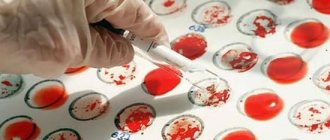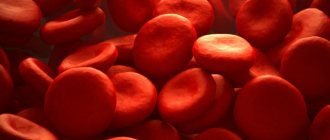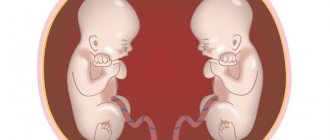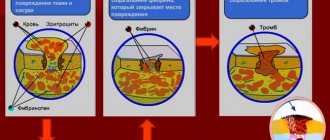People in ordinary life rarely attach great importance to what Rh factor or blood type they have. However, this information is important during operations, blood transfusions and pregnancy.
You can often hear that becoming pregnant with a negative Rh is very dangerous; this can lead to various serious pathologies when carrying a child.
In reality, many young mothers with such Rhesus pregnancy carry and give birth to children quite safely . Indeed, a certain danger is posed by a situation in which in a pair of future parents the woman is Rh negative, and the husband is Rh positive.
In this case, it is important to know what problems pregnancy will bring if the mother’s Rh is negative and the father’s is positive.
What is blood
From a chemistry point of view, blood is a colloidal solution consisting of water, organic (proteins, sugars, lipids, hormones and other complex compounds) and inorganic (sodium, potassium, calcium, magnesium, chlorine, etc.) substances. Formed elements include red blood cells, white blood cells and platelets. In addition, it contains specific substances - antibodies and antigens, the type of which distinguishes blood groups. Today, scientists distinguish over 10 different classifications into groups. The AB0 system, proposed by K. Landsteiner, has been considered the most popular for more than 120 years.
How to determine blood type
Absolutely every person needs to know their blood type. This information can save the life of oneself or another (for example, in case of an accident and the need for an urgent transfusion), preserve pregnancy (in case of Rhesus conflict) and in many other situations. It is almost impossible to determine it at home using modern medicine. To do this, you should contact a special laboratory, where you will be asked to take a finger test. In addition, the group can be calculated by knowing this information about their parents using genetic methods, but this will not give a 100% guarantee of accuracy.
Origin of blood groups
According to the theory of L. Hirszfeld, the appearance of blood groups in humans was the result of a long and complex process of evolution. So, according to scientists, all the most ancient people had the first group. The rest emerged from it through mutations much later.
A number of properties, such as immunity, features of the digestive tract and even the nervous system and mental processes that determine certain character traits, are also tied to the blood group, according to the same scientists. Thus, the first blood group appeared in those days when all of humanity was represented exclusively by hunters: their stomach and intestines are ideally adapted to eating and digesting meat food, which means that people with the first group have high acidity and, as a result, a tendency to gastritis and peptic ulcer of the gastrointestinal tract. In addition, such people are active, characterized by endurance, energy, stress resistance, determination, optimism and determination.
Somewhat later in the process of social evolution and anthropogenesis, a second blood group appeared. In time, this process coincided with the migration of people to the Eurasian continent, where, by the way, to this day people with group 2 predominate. These are farmers, calm and balanced, diligent and hardworking, reserved but not cold, sociable and loyal. They play great team games and join any team. The second blood type of your chosen one is an excellent reason for joy, because these people, as a rule, are excellent family men, regardless of gender.
About 10 thousand years ago, nomads appeared - with the third blood group - open, optimistic, active, prone to change and restless, fickle.
And just a thousand years ago, carriers of the fourth group entered the modern arena - soft, sensitive, extravagant, but at the same time unsure of themselves, slow and indecisive. Whether Jesus Christ had a fourth group or is this just a myth is unknown, but definitely, this is exactly the image that describes people with such blood.
Inheritance
A blood group is physically just a set of antibodies and antigens, the presence and type of which are encoded by a certain set of genes. This means that this trait is inherited from parents to children. But it is a mistake to believe that the second blood type in parents clearly implies a similar sign in their children. Although it is worth noting that in most cases this is true, but if in this situation you had a child with blood type 1, this is not yet a reason to accuse your partner of infidelity! Let's look at the reasons and remember the school course on genetics. The table below shows the correspondence between blood groups and the genes that encode them.
| Blood type | gene |
| 1 | ii |
| 2 | IAIA, IAi |
| 3 | IBIB, IBi |
| 4 | IAIB |
Let's draw up a crossbreeding scheme for two partners with the second blood group:
— R: ♂ IAIA × ♀ IAIA.
- G:IA; IA.
F: IAIA – 100% of offspring have blood group 2.
Option 2:
— R: ♂ IAi × ♀ IAi.
- G:IA; i; IA; i.
F: IAIA, IAi; ii – 66% of offspring have blood group 2, 33% have blood group 1.
Option 3:
— R: ♂ IAIA × ♀ IAi.
- G:IA; i.
F: IAIA, IAi – 100% of offspring have blood group 2.
Thus, we see that the probability of having a child with 1 blood group from parents who have the 2nd blood group exists, although it is small.
Blood type of parents and children
A child's blood type 2 occurs as a result of a combination of parent groups. Most often, children receive it from one of them at conception. It is impossible to plan this in advance.
Table of the probability of a second blood group in a child.
| First parent's blood type | Second parent's blood type | |||
| First | Second | Third | Fourth | |
| First | – | 75% | – | 50% |
| Second | 75% | 94% | 19% | 50% |
| Third | – | 19% | – | 37% |
| Fourth | 50% | 50% | 37% | 25% |
Attention! Parents with the fourth blood group may have a child with the second. This is a scientifically proven fact.
Compatibility of the second blood group
From the point of view of biology, genetics and medicine, the compatibility of people by blood groups is a fundamentally incorrect and meaningless concept, since there are no objective contraindications. However, there are a number of indirect criteria where blood type matters. After all, psychological and sexual compatibility mean no less, and sometimes even more, than physiological compatibility.
The first and second blood groups are, on the whole, a quite successful couple, but the leading place in such relationships is occupied by the sexual intimacy of the partners. Outside of bed, quite frequent conflicts are possible, which, however, will benefit the “second” partner in terms of his personal development.
A man and a woman with blood type 2 make up a truly ideal couple, where complete mutual understanding and stability reign. This may seem boring to some, but not to representatives of this group, because they are extremely conservative.
The second and third blood groups have quite a few points of contact. But both partners have sufficient prudence and perseverance to maintain and develop the relationship. Such a couple will be based on both the sexual aspect and the natural practicality of both partners.
The worst situation is in a couple: the second blood group plus the fourth. Here there will be a minimum level of sexual compatibility and constant interpersonal conflicts. Although such relationships cannot be called particularly successful, they will certainly become bright and memorable for both.
Second blood group: Rh factor
In addition to antibodies and antigens, which were repeatedly mentioned above, in the blood of most people (up to 85%) there is also an antigen located on the surface of red blood cells - erythrocytes. The wording “second positive blood group” means a person who has group 2 according to the AB0 system, on whose red blood cells a specific antigen is located. Despite the fact that the Rh factor in the context of blood groups is not of fundamental importance, we all remember such a concept as Rh conflict, which arises when mixing absolutely any blood groups that have different Rhesus. But is the Rh conflict as terrible as we used to think about it? Let's consider two diametrically opposed situations.
If the mother has a second positive blood group, and the father has a second negative blood group, then in the end there is no question of any Rh conflict. Such a pregnancy, with other positive aspects, always ends in the birth of a healthy baby, regardless of whose rhesus he inherited.
Blood compatibility during transfusion
Due to the presence of different antigens, when transfusing from a donor, group compatibility must be taken into account. Be sure to take into account what kind of Rh a person has, positive or negative. Transfusion without identifying these factors can be fatal.
The donor for A ꓲꓲ can be:
- If the recipient has a second positive blood group, a person with the first or second group, with any Rh factor, will be suitable for him.
- People who have a second negative blood group can be transfused with group 1 or 2 only with negative Rhesus.
The second positive blood is transfused to people with the same characteristics or in emergency cases to the fourth positive. Blood group 2 Rh negative is suitable for the second and fourth group with any Rh.
A woman should carefully consider the planning and course of pregnancy if her blood is Rh negative. Sometimes Rh conflict leads to fetal death. Increasingly, doctors are trying to find blood with similar parameters for transfusion. This can reduce the risk of adverse consequences.
Rhesus conflict
If the mother has a negative blood group and the father has a positive blood type, then this is where the Rh conflict arises. But still far from 100% of cases. This is due to the fact that the mother’s body, which does not have Rh antigens, will perceive the fetal antigens as foreign, which should be destroyed. As a result, there is a high probability of spontaneous abortion in the early stages of pregnancy or the birth of a child with neonatal jaundice (liver damage of varying severity). Moreover, with subsequent pregnancies, the likelihood of a sad outcome becomes increasingly higher.
However, a second negative blood group is not yet a reason to be upset! After all, medicine today does not stand still. Passive immunization of the mother with special anti-D antibodies in the early stages of pregnancy will help prevent the occurrence of Rh conflict and give birth to a healthy child from a loved one, without regard to blood types.
What is the Rh factor?
People's blood contains a lot of important information about themselves and their health.
To obtain this information, new types of analyzes are being developed. The most important parameters of human blood are its belonging to a certain group and its Rh factor.
When determining a group, the most common system is AB0 (0-digit).
In human blood, the surface of red blood cells may contain certain antigens, designated by the letters A, B, D and others.
The presence of antigens A or B, or a combination of them, in the blood determines a person’s blood type. Rh factor is secreted by detecting the D antigen (protein) in blood cells. If this protein is present on the surface of the red blood cell, the person is considered Rh-positive, otherwise – Rh-negative.
This does not affect his health in any way in everyday life. The determination of this factor becomes important only during blood transfusion and during pregnancy.
In cases where the Rh blood levels of a man and a woman are different, a Rh conflict may occur.
Recommendations from experts
Blood type can not only tell you about the secrets of the origin of your family or character traits, the right choice of a partner, but also significantly help in a number of everyday issues.
- So, taking into account that the second blood group was characteristic of farmers, specialists developed a special diet based on blood groups. So, having group 2, you should eat foods of plant origin, with the exception of wheat and beans. Meat and dairy products will contribute to excess weight. But soy, vegetables and fruits, on the contrary, will help you lose weight. Coffee, strong black tea and orange juice should be avoided.
- When choosing a type of physical activity, people with blood type 2 should pay attention to yoga, Pilates, callanetics, athletics, and alpine skiing.
- When choosing a profession, pay attention to legal, accounting and financial, medical, pedagogical, and possibly culinary specialties. But you should avoid leadership positions. You are more of an excellent performer than a boss.
- In terms of health, be especially attentive to the gastrointestinal tract, cardiovascular system, kidneys and teeth.
- Try to avoid alcohol and excessive eating.
Advantages and disadvantages
People with the second blood group have certain character tendencies and predispositions to diseases. Studying them comes down to collecting data from a huge number of respondents of different ages, professions, nationalities, gender, hair color, eyes, skin. Then the statistical data is processed, summarized and conclusions are drawn.
A positive character trait of a person who has the second blood type is his adaptability to external circumstances, to food, and optimism. Disadvantage: tendency to be overweight and stressed. Such people need to stick to a diet, force themselves to exercise, and lead an active lifestyle.
What do scientists say?
Official science does not want to either confirm or refute the entire array of statistical data that humanity has accumulated on the relationship of blood groups with almost all spheres of human life. The most active position is distinguished by Asian scientists, in particular the Japanese, who have written a lot of articles on research on the influence of blood type on a person’s character, health, personal life and professional qualities.
Despite the fact that the physiology of blood groups was discovered by scientists more than 100 years ago, more and more new facts related to the composition of this biological fluid are still emerging in the scientific community. So, they will tell us how to eat right, where it is better to work, who to be friends with and whom to avoid, and sometimes they even predict our fate! This is especially true in Asian countries, where blood type is used to choose not only a life partner and friends, but even employees when hiring. Today it is still difficult to say unequivocally whether this is justified or whether it is closer to prejudice, since too little statistically reliable material has been collected by scientists on these facts. However, what the hell is not joking! It wouldn't hurt to listen!
Treatment and prevention of Rh conflict
If antibodies are detected in a pregnant woman, nonspecific treatment is prescribed - a course of vitamins and antihistamines.
A procedure is also indicated - plasmaphoresis, in which the mother’s blood is cleansed of proteins.
In case of urgent need, intrauterine blood transfusion is performed, but such manipulation is associated with certain risks.
Treatment is carried out in a hospital setting under the supervision of doctors specializing in this problem.
To avoid problems associated with Rh sensitization in the future, it is important to determine the Rhesus of both partners when planning conception. If a couple’s Rhesus numbers do not match and the expectant mother’s Rhesus factor is negative, then it is necessary to consult a doctor and prepare for possible problems.
A measure to prevent Rh sensitization is the administration of a special immunoglobulin after surgery, blood transfusion, and childbirth.
A woman should clearly understand that if she is Rh negative and hopes to become a mother, then abortion is not advisable for her, especially if she is pregnant for the first time.
Planning conception and proper preparation for pregnancy will help avoid many complications in the future.
A woman with negative Rh with a “positive” partner will be able to get pregnant, carry and give birth to a healthy child without any problems if she approaches the advice of specialists with all the necessary responsibility and follows the necessary procedures.
We advise all women to find out what cytomegalovirus is, what are the signs of a frozen pregnancy in the early stages, when the first ultrasound is done and whether menstruation can occur in the first weeks.










